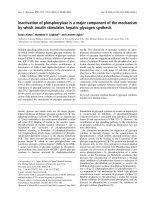Getting Married
Bạn đang xem bản rút gọn của tài liệu. Xem và tải ngay bản đầy đủ của tài liệu tại đây (86.27 KB, 11 trang )
Getting Married
by
George Bernard Shaw
Web-Books.Com
Getting Married
Preface................................................................................................................... 3
Getting Married................................................................................................... 49
Preface
The Revolt Against Marriage
There is no subject on which more dangerous nonsense is talked and thought
than marriage. If the mischief stopped at talking and thinking it would be bad
enough; but it goes further, into disastrous anarchical action. Because our
marriage law is inhuman and unreasonable to the point of downright
abomination, the bolder and more rebellious spirits form illicit unions, defiantly
sending cards round to their friends announcing what they have done. Young
women come to me and ask me whether I think they ought to consent to marry
the man they have decided to live with; and they are perplexed and astonished
when I, who am supposed (heaven knows why!) to have the most advanced
views attainable on the subject, urge them on no account to compromize
themselves without the security of an authentic wedding ring. They cite the
example of George Eliot, who formed an illicit union with Lewes. They quote a
saying attributed to Nietzsche, that a married philosopher is ridiculous, though
the men of their choice are not philosophers. When they finally give up the idea
of reforming our marriage institutions by private enterprise and personal
righteousness, and consent to be led to the Registry or even to the altar, they
insist on first arriving at an explicit understanding that both parties are to be
perfectly free to sip every flower and change every hour, as their fancy may
dictate, in spite of the legal bond. I do not observe that their unions prove less
monogamic than other people's: rather the contrary, in fact; consequently, I do
not know whether they make less fuss than ordinary people when either party
claims the benefit of the treaty; but the existence of the treaty shews the same
anarchical notion that the law can be set aside by any two private persons by the
simple process of promising one another to ignore it.
Marriage Nevertheless Inevitable
Now most laws are, and all laws ought to be, stronger than the strongest
individual. Certainly the marriage law is. The only people who successfully evade
it are those who actually avail themselves of its shelter by pretending to be
married when they are not, and by Bohemians who have no position to lose and
no career to be closed. In every other case open violation of the marriage laws
means either downright ruin or such inconvenience and disablement as a
prudent man or woman would get married ten times over rather than face. And
these disablements and inconveniences are not even the price of freedom; for,
as Brieux has shewn so convincingly in Les Hannetons, an avowedly illicit union
is often found in practice to be as tyrannical and as hard to escape from as the
worst legal one.
We may take it then that when a joint domestic establishment, involving
questions of children or property, is contemplated, marriage is in effect
compulsory upon all normal people; and until the law is altered there is nothing
for us but to make the best of it as it stands. Even when no such establishment is
desired, clandestine irregularities are negligible as an alternative to marriage.
How common they are nobody knows; for in spite of the powerful protection
afforded to the parties by the law of libel, and the readiness of society on various
other grounds to be hoodwinked by the keeping up of the very thinnest
appearances, most of them are probably never suspected. But they are neither
dignified nor safe and comfortable, which at once rules them out for normal
decent people. Marriage remains practically inevitable; and the sooner we
acknowledge this, the sooner we shall set to work to make it decent and
reasonable.
What Does The Word Marriage Mean
However much we may all suffer through marriage, most of us think so little
about it that we regard it as a fixed part of the order of nature, like gravitation.
Except for this error, which may be regarded as constant, we use the word with
reckless looseness, meaning a dozen different things by it, and yet always
assuming that to a respectable man it can have only one meaning. The pious
citizen, suspecting the Socialist (for example) of unmentionable things, and
asking him heatedly whether he wishes to abolish marriage, is infuriated by a
sense of unanswerable quibbling when the Socialist asks him what particular
variety of marriage he means: English civil marriage, sacramental marriage,
indissoluble Roman Catholic marriage, marriage of divorced persons, Scotch
marriage, Irish marriage, French, German, Turkish, or South Dakotan marriage.
In Sweden, one of the most highly civilized countries in the world, a marriage is
dissolved if both parties wish it, without any question of conduct. That is what
marriage means in Sweden. In Clapham that is what they call by the senseless
name of Free Love. In the British Empire we have unlimited Kulin polygamy,
Muslim polygamy limited to four wives, child marriages, and, nearer home,
marriages of first cousins: all of them abominations in the eyes of many worthy
persons. Not only may the respectable British champion of marriage mean any of
these widely different institutions; sometimes he does not mean marriage at all.
He means monogamy, chastity, temperance, respectability, morality, Christianity,
anti-socialism, and a dozen other things that have no necessary connection with
marriage. He often means something that he dare not avow: ownership of the
person of another human being, for instance. And he never tells the truth about
his own marriage either to himself or any one else.
With those individualists who in the mid-XIXth century dreamt of doing away with
marriage altogether on the ground that it is a private concern between the two
parties with which society has nothing to do, there is now no need to deal. The
vogue of "the self-regarding action" has passed; and it may be assumed without
argument that unions for the purpose of establishing a family will continue to be
registered and regulated by the State. Such registration is marriage, and will
continue to be called marriage long after the conditions of the registration have
changed so much that no citizen now living would recognize them as marriage
conditions at all if he revisited the earth. There is therefore no question of
abolishing marriage; but there is a very pressing question of improving its
conditions. I have never met anybody really in favor of maintaining marriage as it
exists in England to-day. A Roman Catholic may obey his Church by assenting
verbally to the doctrine of indissoluble marriage. But nobody worth counting
believes directly, frankly, and instinctively that when a person commits a murder
and is put into prison for twenty years for it, the free and innocent husband or
wife of that murderer should remain bound by the marriage. To put it briefly, a
contract for better for worse is a contract that should not be tolerated. As a matter
of fact it is not tolerated fully even by the Roman Catholic Church; for Roman
Catholic marriages can be dissolved, if not by the temporal Courts, by the Pope.
Indissoluble marriage is an academic figment, advocated only by celibates and
by comfortably married people who imagine that if other couples are
uncomfortable it must be their own fault, just as rich people are apt to imagine
that if other people are poor it serves them right. There is always some means of
dissolution. The conditions of dissolution may vary widely, from those on which
Henry VIII. procured his divorce from Katharine of Arragon to the pleas on which
American wives obtain divorces (for instance, "mental anguish" caused by the
husband's neglect to cut his toenails); but there is always some point at which the
theory of the inviolable better-for-worse marriage breaks down in practice. South
Carolina has indeed passed what is called a freak law declaring that a marriage
shall not be dissolved under any circumstances; but such an absurdity will
probably be repealed or amended by sheer force of circumstances before these
words are in print. The only question to be considered is, What shall the
conditions of the dissolution be?
Survivals Of Sex Slavery
If we adopt the common romantic assumption that the object of marriage is bliss,
then the very strongest reason for dissolving a marriage is that it shall be
disagreeable to one or other or both of the parties. If we accept the view that the
object of marriage is to provide for the production and rearing of children, then
childlessness should be a conclusive reason for dissolution. As neither of these
causes entitles married persons to divorce it is at once clear that our marriage
law is not founded on either assumption. What it is really founded on is the
morality of the tenth commandment, which English women will one day succeed
in obliterating from the walls of our churches by refusing to enter any building
where they are publicly classed with a man's house, his ox, and his ass, as his
purchased chattels. In this morality female adultery is malversation by the woman
and theft by the man, whilst male adultery with an unmarried woman is not an
offence at all. But though this is not only the theory of our marriage laws, but the
practical morality of many of us, it is no longer an avowed morality, nor does its
persistence depend on marriage; for the abolition of marriage would, other things









